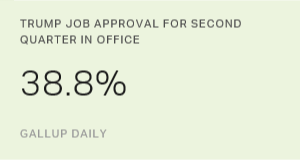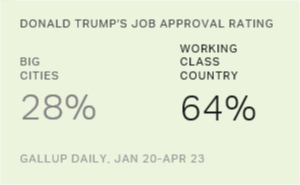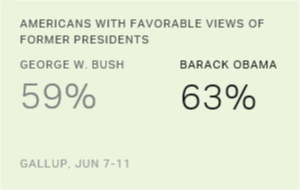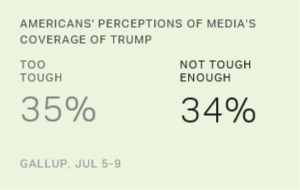Story Highlights
- Averages 38.8%, down from 41.3% in first quarter
- Clinton is the only other president below 50% in second quarter
- Historical average second-quarter rating is 62%
WASHINGTON, D.C. -- President Donald Trump averaged 38.8% job approval during his second quarter in office, which spanned April 20 through July 19. No other president has had a worse second-quarter average. Bill Clinton is the only other president who fell below the majority level of approval at a comparable point in his administration.
| Dates of second quarter | Average job approval % | Number of polls | |||||||||||||||||||||||||||||||||||||||||||||||||||||||||||||||||||||||||||||||||||||||||||||||||
|---|---|---|---|---|---|---|---|---|---|---|---|---|---|---|---|---|---|---|---|---|---|---|---|---|---|---|---|---|---|---|---|---|---|---|---|---|---|---|---|---|---|---|---|---|---|---|---|---|---|---|---|---|---|---|---|---|---|---|---|---|---|---|---|---|---|---|---|---|---|---|---|---|---|---|---|---|---|---|---|---|---|---|---|---|---|---|---|---|---|---|---|---|---|---|---|---|---|---|---|
| John Kennedy | 1961 Apr 20-Jul 19 | 76.2 | 5 | ||||||||||||||||||||||||||||||||||||||||||||||||||||||||||||||||||||||||||||||||||||||||||||||||
| Dwight Eisenhower | 1953 Apr 20-Jul 19 | 71.5 | 2 | ||||||||||||||||||||||||||||||||||||||||||||||||||||||||||||||||||||||||||||||||||||||||||||||||
| George H.W. Bush | 1989 Apr 20-Jul 19 | 63.8 | 4 | ||||||||||||||||||||||||||||||||||||||||||||||||||||||||||||||||||||||||||||||||||||||||||||||||
| Jimmy Carter | 1977 Apr 20-Jul 19 | 63.5 | 6 | ||||||||||||||||||||||||||||||||||||||||||||||||||||||||||||||||||||||||||||||||||||||||||||||||
| Barack Obama | 2009 Apr 20-Jul 19 | 62.0 | 89 | ||||||||||||||||||||||||||||||||||||||||||||||||||||||||||||||||||||||||||||||||||||||||||||||||
| Richard Nixon | 1969 Apr 20-Jul 19 | 62.0 | 5 | ||||||||||||||||||||||||||||||||||||||||||||||||||||||||||||||||||||||||||||||||||||||||||||||||
| Ronald Reagan | 1981 Apr 20-Jul 19 | 60.8 | 5 | ||||||||||||||||||||||||||||||||||||||||||||||||||||||||||||||||||||||||||||||||||||||||||||||||
| George W. Bush | 2001 Apr 20-Jul 19 | 55.8 | 9 | ||||||||||||||||||||||||||||||||||||||||||||||||||||||||||||||||||||||||||||||||||||||||||||||||
| Bill Clinton | 1993 Apr 20-Jul 19 | 44.0 | 8 | ||||||||||||||||||||||||||||||||||||||||||||||||||||||||||||||||||||||||||||||||||||||||||||||||
| Donald Trump | 2017 Apr 20-Jul 19 | 38.8 | 88 | ||||||||||||||||||||||||||||||||||||||||||||||||||||||||||||||||||||||||||||||||||||||||||||||||
| Gallup | |||||||||||||||||||||||||||||||||||||||||||||||||||||||||||||||||||||||||||||||||||||||||||||||||||
Most presidents were still in the honeymoon phase of their presidencies during their second quarter, and enjoyed approval ratings above 60%, with John Kennedy and Dwight Eisenhower both above 70%. The average approval rating for elected presidents in their second quarter is 62%, meaning Trump's support is 23 percentage points below the historical norm.
From a broader historical perspective, Trump's second quarter ranks 250th out of the 287 presidential quarters in which Gallup has assessed job approval since 1945. That ranking places Trump's second quarter in the 13th percentile of all presidential quarters, meaning only 12% have been worse -- mostly for Harry Truman, Richard Nixon, Jimmy Carter and George W. Bush near the end of their troubled administrations.
Trump Approval Down Slightly From Weak First-Quarter Ratings
Trump's second-quarter average is down from 41.3% during his first quarter, which was also well below what any other president had in his first quarter.
During the early part of his second quarter in late April and early May, Trump's approval ratings in Gallup Daily tracking mostly stayed in the low 40% range. After the controversial firing of FBI Director James Comey on May 9, Trump's approval rating dropped below 40%. Since then, his approval rating has mainly been in the high 30% range, apart from a 41% average the week of May 22-28 after a major terrorist attack at a Manchester, England, concert venue where American artist Ariana Grande was performing.
In the second quarter, he averaged 85% job approval among Republicans and 8% among Democrats, with independents at 34%. His approval is down in the second quarter among all party groups, including three points among independents, two points among Republicans and one point among Democrats.
| First quarter (Jan 20-Apr 19) | Second quarter (Apr 20-Jul 19) | Change | |||||||||||||||||||||||||||||||||||||||||||||||||||||||||||||||||||||||||||||||||||||||||||||||||
|---|---|---|---|---|---|---|---|---|---|---|---|---|---|---|---|---|---|---|---|---|---|---|---|---|---|---|---|---|---|---|---|---|---|---|---|---|---|---|---|---|---|---|---|---|---|---|---|---|---|---|---|---|---|---|---|---|---|---|---|---|---|---|---|---|---|---|---|---|---|---|---|---|---|---|---|---|---|---|---|---|---|---|---|---|---|---|---|---|---|---|---|---|---|---|---|---|---|---|---|
| % | % | pct. pts. | |||||||||||||||||||||||||||||||||||||||||||||||||||||||||||||||||||||||||||||||||||||||||||||||||
| Republicans | 87 | 85 | -2 | ||||||||||||||||||||||||||||||||||||||||||||||||||||||||||||||||||||||||||||||||||||||||||||||||
| Independents | 37 | 34 | -3 | ||||||||||||||||||||||||||||||||||||||||||||||||||||||||||||||||||||||||||||||||||||||||||||||||
| Democrats | 9 | 8 | -1 | ||||||||||||||||||||||||||||||||||||||||||||||||||||||||||||||||||||||||||||||||||||||||||||||||
| Gallup Daily | |||||||||||||||||||||||||||||||||||||||||||||||||||||||||||||||||||||||||||||||||||||||||||||||||||
The high degree of political polarization in Trump's approval ratings is one major reason why his overall ratings are historically low. Presidential job approval ratings have become increasingly polarized in recent presidential administrations, but the degree of party separation in Trump's ratings reaches new extremes.
The 77-point Republican vs. Democrat gap in Trump's second-quarter ratings compares with a 65-point gap for Obama, 61 points for George W. Bush, and 50 points for Clinton during their respective second quarters. Prior to Clinton, the party gaps averaged 32 points.
| Approval, Democrats | Approval, Republicans | Party gap | |||||||||||||||||||||||||||||||||||||||||||||||||||||||||||||||||||||||||||||||||||||||||||||||||
|---|---|---|---|---|---|---|---|---|---|---|---|---|---|---|---|---|---|---|---|---|---|---|---|---|---|---|---|---|---|---|---|---|---|---|---|---|---|---|---|---|---|---|---|---|---|---|---|---|---|---|---|---|---|---|---|---|---|---|---|---|---|---|---|---|---|---|---|---|---|---|---|---|---|---|---|---|---|---|---|---|---|---|---|---|---|---|---|---|---|---|---|---|---|---|---|---|---|---|---|
| % | % | pct. pts. | |||||||||||||||||||||||||||||||||||||||||||||||||||||||||||||||||||||||||||||||||||||||||||||||||
| Donald Trump | 8 | 85 | 77 | ||||||||||||||||||||||||||||||||||||||||||||||||||||||||||||||||||||||||||||||||||||||||||||||||
| Barack Obama | 91 | 26 | 65 | ||||||||||||||||||||||||||||||||||||||||||||||||||||||||||||||||||||||||||||||||||||||||||||||||
| George W. Bush | 29 | 90 | 61 | ||||||||||||||||||||||||||||||||||||||||||||||||||||||||||||||||||||||||||||||||||||||||||||||||
| Bill Clinton | 71 | 21 | 50 | ||||||||||||||||||||||||||||||||||||||||||||||||||||||||||||||||||||||||||||||||||||||||||||||||
| Ronald Reagan | 44 | 87 | 43 | ||||||||||||||||||||||||||||||||||||||||||||||||||||||||||||||||||||||||||||||||||||||||||||||||
| George H.W. Bush | 48 | 84 | 36 | ||||||||||||||||||||||||||||||||||||||||||||||||||||||||||||||||||||||||||||||||||||||||||||||||
| Richard Nixon | 50 | 82 | 32 | ||||||||||||||||||||||||||||||||||||||||||||||||||||||||||||||||||||||||||||||||||||||||||||||||
| John Kennedy | 87 | 57 | 30 | ||||||||||||||||||||||||||||||||||||||||||||||||||||||||||||||||||||||||||||||||||||||||||||||||
| Dwight Eisenhower | 60 | 88 | 28 | ||||||||||||||||||||||||||||||||||||||||||||||||||||||||||||||||||||||||||||||||||||||||||||||||
| Jimmy Carter | 73 | 48 | 25 | ||||||||||||||||||||||||||||||||||||||||||||||||||||||||||||||||||||||||||||||||||||||||||||||||
| Gallup | |||||||||||||||||||||||||||||||||||||||||||||||||||||||||||||||||||||||||||||||||||||||||||||||||||
Bottom Line
Trump has set new record lows for job approval ratings early in presidential terms, including his initial 45% reading, his first-quarter average of 41.3%, and his second-quarter average of 38.8%. Six months into his presidency, he has yet to register a single job approval rating above 50%, averaging 40% job approval to date.
Trump maintains solid support among his fellow Republicans. However, with fewer than three in 10 Americans identifying as Republican he cannot rely on Republicans alone to have healthy job approval ratings.
So far, independents are less inclined to approve of Trump than they were to approve of prior presidents. All prior presidents averaged 53% job approval among independents, compared with 36% for Trump to date. Carter had the lowest average support among independents, at 42%.
Democratic opposition to Trump appears to be entrenched, and those who disapprove of him largely cite Trump's personal character as the reason for their disapproval. Thus, it may be hard for Democrats to express approval of Trump no matter what he does in office.
Though it may be premature to compare Trump's six-month ratings to other presidents' full-term ratings, Trump is on pace to register the lowest approval rating for a president over a full term, a distinction currently held by Truman and Carter at 45%.
These data are available in Gallup Analytics.
Explore President Trump's approval ratings in depth and compare them with those of past presidents in the Gallup Presidential Job Approval Center.
Survey Methods
Results for this Gallup poll are based on telephone interviews conducted April 20-July 19, 2017, on the Gallup U.S. Daily survey, with a random sample of 52,765 adults, aged 18 and older, living in all 50 U.S. states and the District of Columbia. For results based on the total sample of national adults, the margin of sampling error is ±1 percentage point at the 95% confidence level. All reported margins of sampling error include computed design effects for weighting.
Each sample of national adults includes a minimum quota of 70% cellphone respondents and 30% landline respondents, with additional minimum quotas by time zone within region. Landline and cellular telephone numbers are selected using random-digit-dial methods.
Learn more about how the Gallup U.S. Daily works.




